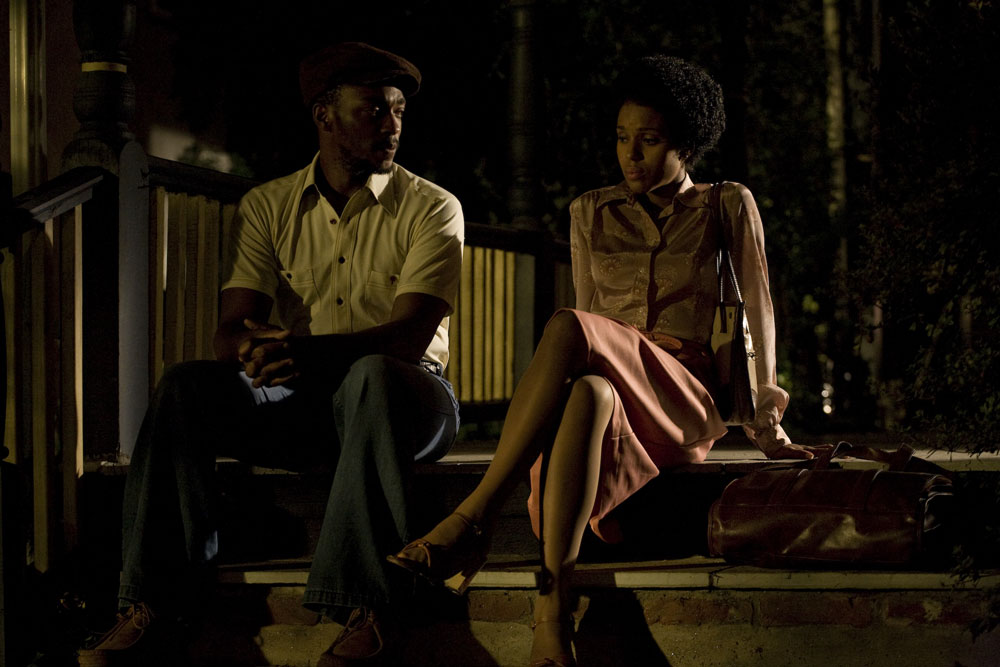Spirit of ’76: Tanya Hamilton’s History Lessons

STILL FROM NIGHT CATCHES US COURTESY OF MAGNOLIA PICTURES
Just as the winter chill sets in, the new film Night Catches Us (opening on Friday) takes us back to the dog days of summer. Set over a few simmering July weeks in 1976, the film follows Marcus, a former Black Panther, who returns after a decade on the run for allegedly ratting out a fellow panther. The film focuses on the breakdown of the Black Panthers and their community, embodied by the enigmatic Anthony Mackie as Marcus and Kerry Washington as the heartbreakingly poised Patty, the widow of Marcus’s friend. Written and directed by first-time director Tanya Hamilton, Night Catches Us keeps the traditional cartoonish hallmarks of 1970s style to a minimum, instead relying on pitch-perfect music to evoke the film’s distinctive era. We caught up with Hamilton in New York and talked to her about shooting in her hometown and avoiding 70’s clichés.
GILLIAN MOHNEY: It’s your first time directing a full-length movie. What was it about this story that made you want to direct it?
TANYA HAMILTON: I think the long and short of it is, I like a lot about that period. I think there’s something tragic and romantic about it. In many ways, it’s looking at this distinctly African-American period and distilling it through my detached foreigner eyes. My mom had a friend who did a sit-in at the White House and went to jail for six months. I’ve been going through all of her letters to prepare for this talk. And I look at all of these letters to her mom. She goes in with this great enthusiasm. She was my great inspiration for the Patty character. The letters are so optimistic: “We’re not going break any rules.” Then there is a letter midway through, when they’re sequestered in their cells, and she was very upset about it. There was a seven-page rant about how they had been lulled to sleep by non-violence. Even though I respect the Black Panther movement for what they put back into the community, I wanted to look at that progression in a nutshell. What propels you as a youth to feel optimism? What inspires you to feel bitterness and regret?
MOHNEY: You have a great cast, with Anthony Mackie and Kerry Washington, for your first film. Can you talk about what casting was like and what you were looking for?
HAMILTON: When I first started casting, I was so naïve in a certain way. I don’t have that intuitive sense of “Oh, that actor’s perfect!” What do I know? But I knew people who were wrong for a part. I knew that [Patty] needed to be really African-American and ordinary African-American. Angela Davis was my physical model. With Marcus, it was harder. I knew, sort of, what I wanted him to look like. I knew he needed to be a man who had these two things in him, this great softness and kindness and still someone who ran guns… I knew Mackie is a guy who is capable of saying a lot by saying very little. I think Kerry Washington reminds me of all the girls I knew in high school. I think that’s a nice quality of being ordinary yet extraordinary in the same breath. It was nice surprise.
MOHNEY: They had amazing chemistry—sometimes they weren’t even talking and it was palpable.
HAMILTON: That’s just them. They have their own personal private chemistry—it’s really true. We were lucky.
MOHNEY: The setting is really fascinating, because the houses in the area are fantastic, but the community is somewhat poor, and they seem like they’re just falling down because people don’t have enough money to keep them going.
HAMILTON: It’s also really Philly. I live in Philly now—since 2000. When the crew came down, they were like “This is not a neighborhood with working poor.” I was like “No, no, it is.” That’s the thing; if you don’t live in Philly, you don’t know. It’s the oldest city in the US, and it also used to be one the wealthiest. The city used to have tremendous wealth, and it doesn’t anymore, and what you find is the detritus of that. There are people who are working class—working poor living in these [giant] houses. And they’re falling apart because it’s a struggle to keep them up, because they’re huge and they’re old. On the surface it looks like a middle-class neighborhood, but they’re struggling there.
MOHNEY: The music you use throughout the film is fantastic. Can you talk about how you picked certain songs?
HAMILTON: I had a partner, Dan Friedlander, who is an old friend from Columbia. We’ve been collaborating on the music for a long time. By collaborating, it would be him being like, “Isn’t this cool? Listen to this one!” I think we had this theory about the music that we wanted to create three sections to this film. The film kind of exists in three worlds: in the past, with the archive footage, and their present, in the ’70s, and also in their future and our present. It felt like we wanted to do the music in the same way. We tried to choose pieces from those sections. The Roots would obviously be from our present. We [had] love tunes from the ’60s, and that’s their history. Then there’s [songs] that are all distinctly ’70s, but with a political bent.
NIGHT CATCHES US IS OUT IN LIMITED RELEASE TOMORROW, DECEMBER 3.






